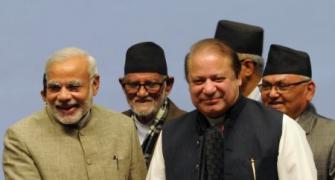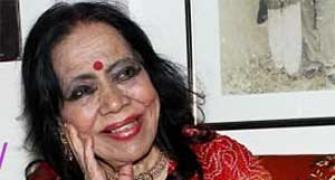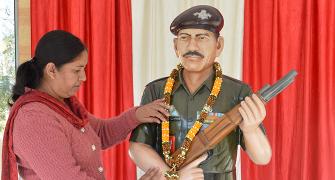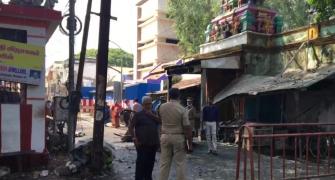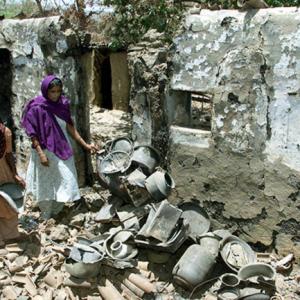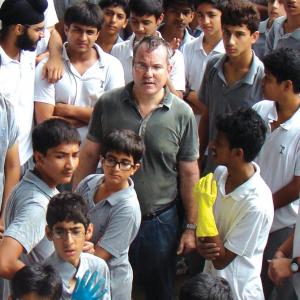'It is very relevant that we don't lose sight of the foundations we have built modern India on and that is what I am afraid may be happening,' Nayantara Sahgal tells Archana Masih/Rediff.com
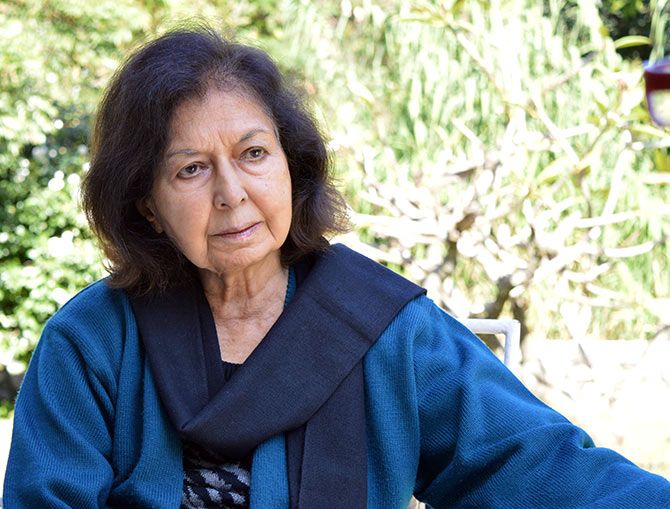
'We saw the vigour of democracy when it voted Modi out of humble origins as prime minister. It was Nehru who laid that foundation for India and what is worrying is Mr Modi's rather imperial style of functioning...'
Nayantara Sahgal is a dignified, soft-spoken 87-year-old lady, with a razor sharp memory.
'As a child I wanted to grow up quickly so that I could go to jail'
What are your best memories of Anand Bhavan, the home of the Nehrus in Allahabad, that you grew up in?
They are mixed. There was a great feeling of loneliness of a child separated from parents. Of not knowing what tomorrow would bring.
Indeed my parents didn't know what tomorrow would bring. Who knew what could happen at that time if you rebelled against the British government?
Penalties were very severe, they could range from deportation to imprisonment to death -- and indeed did too from the early part of the 20th century until it became a non violent movement under Gandhiji.
Satyagrahis landed in jail -- sometimes for years at a time and they were pledged not to pay the fines that the British government demanded. The police would come to our home, raid and take away valuables in lieu of the fines that satyagrahis refused to pay.
So it was not a luxurious home. The luxurious home had been given to the Congress party by my grandfather Motilal Nehru. It was the home where my mother was born and grew up.
It was called Anand Bhavan, but when my grandfather met Gandhiji on the Dandi March and told him that he was giving the home to the Congress party, he had built a smaller house on the estate, which he then named Anand Bhavan.
We didn't want to live in a house which was not called Anand Bhavan (laughs).
The older house, the huge mansion where every luxury had prevailed, was called Swaraj Bhavan after that. The home we lived in was bare of all luxuries because everything of value had been raided and taken away by the police. Once, it happened in front of my eyes.
Just as it was a difficult time for the freedom fighters in your family, it must have been a difficult time for you children too?
It was a difficult time for children growing up in those circumstances, yet our upbringing was such that there was a great sense of pride that our parents were part of a great struggle, and we considered ourselves as young soldiers in this struggle.
As a child my ambition used to be that I grow up quickly so that I could go to jail. There was this great feeling of belonging to an adventure that my uncle (Nehru) gave us as he gave the whole nation.
I think of Allahabad as my childhood home. It has a mystique for me because of having grown up at a very inspiring time in the country's life and my family's life.
I last went to Anand Bhavan when Rajiv (former prime minister Rajiv Gandhi) took me and my children with my mother's ashes in 1990. He flew us to Anand Bhavan and we immersed her ashes at the Sangam.
In a family of writers, what was the environment when you were growing up?
All my family were writers. They wrote wonderful letters. There was an ongoing correspondence between my mother and my uncle, Nehru, which I published some years ago called Nehru's Letters to his Sister.
It is a wonderful picture of those times, he was 11 years her senior and very much her adored brother. It is a wonderful record of a relationship.
Similarly, my father wrote us very remarkable letters from jail as children, illustrating them for us to understand. It was a family that was given to writing and apart from that I grew up in a house full of books. On the shelves I could find books my mother had read as a child.
My growing up was a time when the family was under severe emotional and economic stress by virtue of the fact that my uncle and my parents were spending the best years of their life in jail. There were long separations from them.
My sisters and I grew up, sometimes for many months, sometimes a year or more, separated from our parents where we had to depend on each other and fend for ourselves.
We had a governess, a grandmother, great aunt in the house, but it wasn't a normal childhood. In fact the first book I wrote, Prison and Chocolate Cake, describes it.
It must have been very traumatic for you when your father passed away in Lucknow jail in 1944.
Madame Chiang Kaishek helped to admit us to her alma mater Wellesley College in the United States.
We went there in the middle of the War with both my parents in jail. We were there when my father died. It was horrifying news. The full brunt of it hit one when one came home and he was not there.
My sister and I for many complicated reasons which is hard to go into here except the fact that one wouldn't have been allowed to attend university in India without giving the guarantee that one wouldn't take part in political activities.
So we were sent away to America with the help of Madame Chiang Kaishek who with Generalissimo (Chiang Kaishek, Mao Zedong's bitter enemy) had come to India some years before to try and persuade the British government to set up a national government.
President (Franklin Delano) Roosevelt was trying to do the same so that India could become a full cooperator in the war on the Allied side. Of course, the British didn't agree to that.
After university, did you return home to Allahabad?
No. It was after Partition. My uncle had gone to Delhi as prime minister. My mother had been sent to Moscow as India's first ambassador to the Soviet Union, my father had died. I came to stay with my uncle at 17 York Road in Delhi. I deeply felt my father's absence.
How much of your desire to write was motivated by your uncle?
It was not motivated by him, but motivated by a desire to keep alive the atmosphere of my childhood. To keep alive that moment in history when India was fighting for freedom and my own view of the struggle as a young girl in a family that was deeply involved in it.
Of course, when I asked my uncle whether I should join the Congress party or politics in the early 1950s, he said you like to write, so why not write. That settled the matter for me although at one time President (Sarvepalli) Radhakrishnan was very keen that I should be given a ticket to Parliament.
He told my mother: 'You tell her now to stop looking after her children and come into Parliament.'
But I had no desire to go into politics or to have anything to do with the corridors of power except as it turned out to use politics as a material for my writing because that was the material from my childhood. That was my natural material.
What did Pandit Nehru think of your writing?
My first novel was dedicated to him. It was called A Time to be Happy. I think three of my books were published before he died in 1964.
He was a great irreplaceable figure for me as was my father and with two men like that in my life, no other man has been able to match up. It would be an impossible task. It was not an act that anybody could follow.
She has had a ringside view of Indian politics as the niece of India's first prime minister, Jawaharlal Nehru; daughter of politician-diplomat and first lady president of the UN General Assembly, Vijayalakshmi Pandit and younger cousin of two-time prime minister Indira Gandhi, whose autocratic politics she criticised and whose father she adored.
'I have never been as passionately devoted to anyone as I was to him (Nehru). He was a rare and wonderful human being. There will not be another like him in a thousand years,' she wrote a week after Nehru's death in a letter to E N Mangat Rai, an Indian Civil Service officer she married after the failure of her first marriage to Gautam Sahgal.
One of the country's incisive political commentators, she has over ten books to her credit which provide a fascinating insight into her personal as well as India's political journey.
In a lively interview with Archana Masih/Rediff.com, she spoke about growing up at a unique time in India's history, the similarities between Indira Gandhi and Narendra Modi and why Nehru's legacy is India's legacy.
Part I of a must read interview:
What was Nehru like as an uncle?
Like my parents, I thought of him as my third parent. The national movement under Gandhi lasted 26 years from 1921 onward. Of those my uncle spent 10 in jail.
I have some wonderful letters he wrote to me from jail. He was very involved in our growing up as in his own daughter's.
He wrote Letter from a Father to his Daughter, and then published Glimpses of World History which was the first world history ever written from an Asian viewpoint.
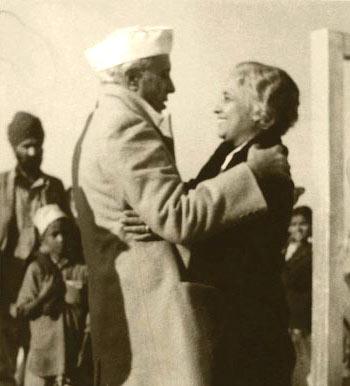 Image: Nehru with his sister and Nayantara Sahgal's mother Vijayalakshmi Pandit.
Image: Nehru with his sister and Nayantara Sahgal's mother Vijayalakshmi Pandit.
What do you see as his legacy at the present moment?
I try not to think of the present moment (laughs) because it's so frightening.
I think of Nehru's legacy as being India's legacy. It had its birth in the national movement. Ideas like inclusiveness -- that this is a unique country of many religions and cultures; that we are enriched by that pluralilty and secularism.
Secularism and inclusiveness -- I fear for their future today because of the tendencies we have already seen -- of the RSS (Rashtriya Swayamsevak Sangh) view prevailing in history books already.
In Gujarat history books are in circulation which are revising history and writing it in almost mythological terms.
There is a lot of talk about development by the present government as if no development had ever taken place before them.
Development began with a huge surge immediately after Independence under Nehru's governments. The progress that India has made comes out of that foundation.
The IITs, agricultural universities, the nuclear establishment, the space exploration, the technological advances we have made, Green Revolution -- all this comes out of the early years of Nehru's governments.
Above all, his first government established universal suffrage and gave every adult Indian man and woman the right to vote. It had never happened in the history of the world that democracy had priority over development.
He took that risk because he felt it would lay the foundation of democracy which indeed it has and we saw how vigorous democracy was when it dislodged authoritarianism under Mrs Indira Gandhi (her first cousin).
Again we saw its vigour when it voted Modi out of humble origins as prime minister. It was Nehru who laid that foundation for India and what is worrying today is Mr Modi's rather imperial style of functioning -- all of this doesn't augur well for democracy.
I’ve often thought how appalled Indians were when Devkant Barua coined the slogan ‘Indira is India’ and now we’ve heard the chairman of the Indian Council for Cultural Relations say that ‘Modi is God!’
These are absurd developments and ridiculous trends which can have very serious consequences for democratic functioning. That is why I say Nehru’s legacy is India’s legacy. If that foundation is dislodged and we are sort of put on another way of thinking as we see happening, it’s a very dangerous trend.
One very dangerous trend is reversal of what Nehru called the ‘scientific temper’. He said it was essential for India’s growth into a modern state. That today is being reversed in statements like the prime minister saying about Ganesh’s head being grafted on a human body by advanced surgery in mythological times - and he said this to a medical audience.
I find this appalling. Which way are we being lead? If this attitude and trend continues, the young of this country in a few years are going to be scientifically illiterate. Already they are being historically illiterate.
Is Nehruvianism losing its relevance in a changing India?
It is even more relevant today than it ever was.
India stood out as a unique example of multi culturalism in the world. At Independence, though India was a devoutly religious country where many religions co-existed, it chose to become a secular state.
It even chose an atheist prime minister.
If we lose it, it’s a loss to the world, not only to India because we were an example for Asia and Africa. India under the Congress party inspired by Nehru reached out to freedom struggles all over Asia and Africa.
It later supported the struggle against Apartheid in South Africa. It spoke out for the seating of the People’s Republic of China at the United Nations and led the non aligned movement which brought half of humanity into the corridors of power which had been voiceless and powerless up until then.
It is very relevant that we don’t lose sight of the foundations we have built modern India on and that is what I am afraid maybe happening.
Do you feel the liberal space is shrinking?
Not only the liberal space is shrinking but common sense is shrinking (laughs).
This great country is being shrunk into a monoculture. It is making a travesty of Hinduism.
That travesty began one might say soon after Independence when Nathuram Godse shot Gandhi. He murdered the greatest Indian alive and the greatest Hindu alive. A Hindu picked up the gun and killed the greatest Hindu in India.
It was a kind of pointer to what is happening now. I see that event linking up with forces which celebrate Nathuram Godse and his ilk and his beliefs. It is a bad, bad turn that things are taking.
Comparisons are drawn between Mrs Gandhi and Mr Modi as both being strong, decisive leaders. Do you see a similarity?
I do. I think it’s perfectly alright to be a strong leader. We need a strong and decisive leadership but we don’t need imperial leadership which disposes off a Cabinet government, which functions alone, which is then in a position where it can exercise arbitrary power – which Mrs Gandhi came to do and which I see Modi intending towards.
Strong, yes but it should not turn into a Fuhrer-style Hitler government where nobody counts but the leader.
It did happen in Mrs Gandhi’s time and Indians dislodged her for that reason. Though she was a remarkable leader in other ways but Indians had settled for democracy and were not willing to negotiate on that issue.
– I fear for their future today'
Now if we retain that insistence on democratic functioning and if we will not submit to any situation which would sour democratic institutions then we will be alright. We will pass through it and become a maturer democracy. But unless we do that the reverse could happen.
You were at the receiving end of Mrs Gandhi’s ire during the Emergency, it has been 30 years since her passing, what do you see as her legacy?
One very brave act was her courageous support to the creation of Bangladesh and the fact that immediately after the Bangladesh war was won and after the surrender, she ended it.
The prisoners India had taken at that time were returned. She acted with great statesman like vision and justice at that time. I would call that the high point of her leadership.
The fact that she called an election in 1977 may have had many reasons. First among them being that her advisers telling her it was safe to do so with the Opposition being in jail. But I think the other reason was that she was a democrat at heart who had taken a wrong turn.
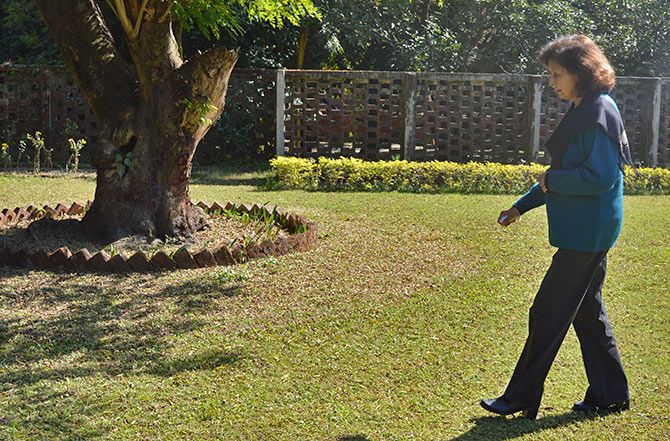
She was very upset with the world-wide reaction against the Emergency, she didn’t expect that. I think she knew that this had to be undone if her reputation was not be destroyed as a democrat. She took that step and suffered an astounding defeat and then staged an astounding comeback.
These are factors in leadership that need to be admired. Here was a woman who you would have thought was finished, she even lost her own seat in Parliament, she didn’t take it lying down, she got up and fought.
I certainly admire her for her leadership for those reasons though I have criticised her on many other platforms.
The Congress is facing its gravest danger? It does not have a strong leader like Mrs Gandhi to mount a comeback like she had?
Yes, it is. It’s going to need a revolutionary step forward for the Congress to revive. There’s no mistake about that.
I believe it can happen because 70% of India’s people did not vote for Modi and the Congress has still got a countrywide presence, however small.
The BJP is seeking to create its own presence all over India which it certainly doesn’t have at the moment. So this is a moment when revival can take place because there is huge talent in the party even among the younger people like Sachin Pilot who made a difference in Rajasthan.
This refusal to move, so far as I can see, maybe we’ll hear when they will hold elections in the party, but up till now they have not made the statement that we’re reinventing ourselves.
I think it’s very important to have a shadow cabinet like Britain. People should be put in place who can tackle issues as they arise in Parliament. That’ll make their voice heard.
They should become a very strong, constructive Opposition.
All Opposition should be constructive, not the kind the BJP was which stalled two entire sessions of Parliament and wasted the country’s money and time in a shocking way.
- Part II of the interview: 'I don't think one family should rule India'

